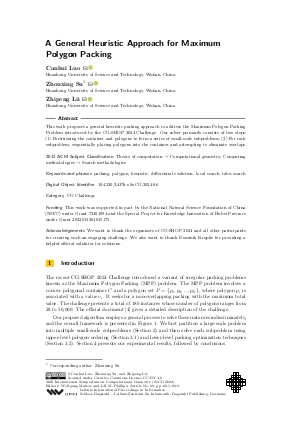A General Heuristic Approach for Maximum Polygon Packing (CG Challenge)
Authors
Canhui Luo  ,
Zhouxing Su
,
Zhouxing Su  ,
Zhipeng Lü
,
Zhipeng Lü 
-
Part of:
Volume:
40th International Symposium on Computational Geometry (SoCG 2024)
Part of: Series: Leibniz International Proceedings in Informatics (LIPIcs)
Part of: Conference: Symposium on Computational Geometry (SoCG) - License:
 Creative Commons Attribution 4.0 International license
Creative Commons Attribution 4.0 International license
- Publication Date: 2024-06-06
File

PDF
LIPIcs.SoCG.2024.86.pdf
- Filesize: 1.75 MB
- 9 pages
Document Identifiers
Subject Classification
ACM Subject Classification
- Theory of computation → Computational geometry
- Computing methodologies → Search methodologies
Keywords
- packing
- polygon
- heuristic
- differential evolution
- local search
- tabu search
Metrics
- Access Statistics
-
Total Accesses (updated on a weekly basis)
0PDF Downloads0Metadata Views
Abstract
This work proposes a general heuristic packing approach to address the Maximum Polygon Packing Problem introduced by the CG:SHOP 2024 Challenge. Our solver primarily consists of two steps: (1) Partitioning the container and polygons to form a series of small-scale subproblems; (2) For each subproblem, sequentially placing polygons into the container and attempting to eliminate overlaps.
Cite As Get BibTex
Canhui Luo, Zhouxing Su, and Zhipeng Lü. A General Heuristic Approach for Maximum Polygon Packing (CG Challenge). In 40th International Symposium on Computational Geometry (SoCG 2024). Leibniz International Proceedings in Informatics (LIPIcs), Volume 293, pp. 86:1-86:9, Schloss Dagstuhl – Leibniz-Zentrum für Informatik (2024)
https://doi.org/10.4230/LIPIcs.SoCG.2024.86
BibTex
@InProceedings{luo_et_al:LIPIcs.SoCG.2024.86,
author = {Luo, Canhui and Su, Zhouxing and L\"{u}, Zhipeng},
title = {{A General Heuristic Approach for Maximum Polygon Packing}},
booktitle = {40th International Symposium on Computational Geometry (SoCG 2024)},
pages = {86:1--86:9},
series = {Leibniz International Proceedings in Informatics (LIPIcs)},
ISBN = {978-3-95977-316-4},
ISSN = {1868-8969},
year = {2024},
volume = {293},
editor = {Mulzer, Wolfgang and Phillips, Jeff M.},
publisher = {Schloss Dagstuhl -- Leibniz-Zentrum f{\"u}r Informatik},
address = {Dagstuhl, Germany},
URL = {https://drops.dagstuhl.de/entities/document/10.4230/LIPIcs.SoCG.2024.86},
URN = {urn:nbn:de:0030-drops-200315},
doi = {10.4230/LIPIcs.SoCG.2024.86},
annote = {Keywords: packing, polygon, heuristic, differential evolution, local search, tabu search}
}
Author Details
Funding
This work was supported in part by the National Natural Science Foundation of China (NSFC) under Grant 72101094 and the Special Project for Knowledge Innovation of Hubei Province under Grant 2022013301015175.
Acknowledgements
We want to thank the organizers of CG:SHOP 2024 and all other participants for creating such an engaging challenge. We also want to thank Dominik Krupke for providing a helpful official validator for solutions.
References
- Alkan Atak, Kevin Buchin, Mart Hagedoorn, Jona Heinrichs, Karsten Hogreve, Guangping Li, and Patrick Pawelczyk. Computing maximum polygonal packings in convex polygons using best-fit, genetic algorithms and ilps. In Symposium on Computational Geometry (SoCG), volume 293 of LIPIcs, pages 83:1-83:9, 2024. URL: https://doi.org/10.4230/LIPIcs.SoCG.2024.83.
-
Edmund K Burke, Robert SR Hellier, Graham Kendall, and Glenn Whitwell. Complete and robust no-fit polygon generation for the irregular stock cutting problem. European Journal of Operational Research, 179(1):27-49, 2007.

- Guilherme Dias da Fonseca and Yan Gerard. Shadoks approach to knapsack polygonal packing. In Symposium on Computational Geometry (SoCG), volume 293 of LIPIcs, pages 84:1-84:9, 2024. URL: https://doi.org/10.4230/LIPIcs.SoCG.2024.84.
- Sándor P. Fekete, Phillip Keldenich, Dominik Krupke, and Stefan Schirra. Maximum polygon packing: The CG:SHOP Challenge 2024, 2024. URL: https://arxiv.org/abs/2403.16203.
-
Fred Glover. Future paths for integer programming and links to artificial intelligence. Computers & operations research, 13(5):533-549, 1986.

- Martin Held. Priority-driven nesting of irregular polygonal shapes within a convex polygonal container based on a hierarchical integer grid. In Symposium on Computational Geometry (SoCG), volume 293 of LIPIcs, pages 85:1-85:6, 2024. URL: https://doi.org/10.4230/LIPIcs.SoCG.2024.85.
-
Takashi Imamichi, Mutsunori Yagiura, and Hiroshi Nagamochi. An iterated local search algorithm based on nonlinear programming for the irregular strip packing problem. Discrete Optimization, 6(4):345-361, 2009.

- Dong C Liu and Jorge Nocedal. On the limited memory BFGS method for large scale optimization. Mathematical programming, 45(1-3):503-528, 1989. URL: http://users.iems.northwestern.edu/~nocedal/lbfgs.html.
-
Rainer Storn. On the usage of differential evolution for function optimization. In Proceedings of north american fuzzy information processing, pages 519-523. Ieee, 1996.

-
Yong Wang, Zixing Cai, and Qingfu Zhang. Differential evolution with composite trial vector generation strategies and control parameters. IEEE transactions on evolutionary computation, 15(1):55-66, 2011.

- Ron Wein, Alon Baram, Eyal Flato, Efi Fogel, Michael Hemmer, and Sebastian Morr. 2D minkowski sums. In CGAL User and Reference Manual. CGAL Editorial Board, 5.6 edition, 2023. URL: https://doc.cgal.org/5.6/Manual/packages.html#PkgMinkowskiSum2.
